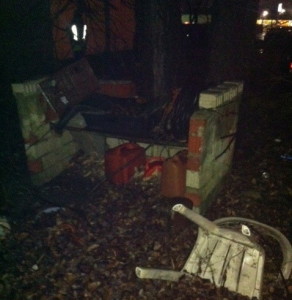New toll-free number proves popular addition to proactive approach
By Kathleen Brady Shea, Managing Editor, The Times

This makeshift housing typifies what volunteers saw during the “point-in-time” count in January that revealed 625 Chester County citizens without a permanent residence.
Wielding flashlights and cartons of supplies – clothes, food and blankets – a team of volunteers sloshed along a mud-drenched path in heavy rain toward a makeshift compound off the beaten track in Kennett Square, a ramshackle complex that more than half a dozen call their home.
The group was one of dozens scattered at sites throughout the county in January for a “point-in-time” count of people living in temporary or emergency shelters, or worse: on the streets. In one of the most affluent counties in the nation, 43 people were found unsheltered and 582 were residing in emergency shelters or temporary housing.
The annual assessment, sponsored by the U.S. Department of Housing and Urban Development (HUD), is performed around the country and helps government gauge the pervasiveness of the problem. This year, it also signaled a new approach to preventing homelessness in Chester County.

Burroughs P. Mack (from left), Heather N. Charboneau, and Michael Hackman answer questions about the county’s Decades to Doorways initiative to prevent homelessness.
In December, the county launched its Decades to Doorways initiative, an ambitious 10-year plan for getting people into permanent housing as quickly as possible and intervening before homelessness occurs. Studies throughout the country have shown that focusing on permanency with appropriate supportive services is more cost-effective than keeping people in shelters.
During an informational session on Thursday, Michael Hackman, the program administrator, presented an update on the program and its myriad developments to a group that included the county commissioners, service providers, and representatives for 12 elected officials.
So far, officials are pleased with the progress – and distressed by the need. For example, one of the newest components of the program is Chester County’s Homeless Coordinated Assessment System, “ConnectPoints,” which lists contact numbers, including a website address and a toll-free number, for anyone seeking emergency shelter or housing services in the county.
Burroughs P. Mack, executive director of Family Service of Chester County, which is administering that component, explained that in the past someone experiencing homelessness would have had to make multiple calls to various shelters and agencies to see if a bed was available. Now, a single call generates an assessment by someone with access to the county’s network of 30 homeless service providers as well as ancillary services, including mental health, drug and alcohol, veterans, and domestic violence, he said.
On July 1, the day the hotline debuted, it generated 95 calls, he said. Since then, the program, which is managed by Heather N. Charboneau, has averaged about 55 calls a day, he said.
Charboneau said the 800 number connects those in need to people who are knowledgeable about the qualifications and availability of assistance. In some cases, a person might be in danger of being evicted because utility bills or rent haven’t been paid, crises that could potentially be averted with the right access to help, she said.
Catherine Friedman, executive director of the Friends Association for the Care & Protection of Children, said historically people had to be homeless before programs were available to assist them. Now, the emphasis is on prevention, she said. A new program is even available to teach people how to be good tenants as a way to avoid evictions, she said.
County Commissioner Terence Farrell asked if the program were available in Spanish, a suggestion that immediately went on the to-do list.
Commissioners’ Chairman Ryan Costello said he is optimistic that the county will save money by being proactive rather than reactive, a scenario that has played out in other parts of the country since the program is based on a national model.
Commissioner Kathi Cozzone said she envisioned great synergy between Decades to Doorways and the planned Financial Stability Center, which will centralize CareerLink, Family Services and Open Hearth, Inc., agencies focused on helping people achieve economic stability.
During the Kennett Square count on Jan. 30, volunteers learned that one resident in the makeshift complex suffered from what sounded like a foot infection. He expressed a desire for permanent housing as long as he could stay in the area, a challenge for many because of the county’s high cost of living. The conversation generated action, Hackman said, noting that the man received medical care the day after the volunteers’ visit and is about to get a permanent living situation.
Mack stressed that “good solutions” don’t exist for everyone. He said sometimes there aren’t enough shelter beds and transportation can be an issue for some since the shelters are clustered in the Coatesville, Phoenixville and West Chester areas. However, the program is evolving with an eye toward increasing the percentage of individuals who can be helped, he said.
“We see this very much as a work in progress,” said Pat Bokovitz, director of the Chester County Department of Community Development. He urged those present to make any concerns known so that problems could be addressed.
Bokovitz said the county submitted an application Thursday for a 2013 Emergency Solutions Grant from the state Department of Community and Economic Development. If the county gets the money, $225,000 will be allocated to financial assistance for re-housing and $75,000 will go to street outreach.
The ConnectPoints website is www.connectpoints.org and the toll-free phone number is 800-935-3181. The website can also be accessed from www.chesco.org.






